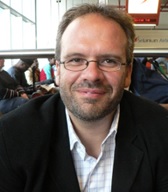20th january
Zsolt Lavicza, Linz School of Education, STEM Education Centre, Johannes Kepler University, Linz, Austria (Google Scholar)

Title of the talk:
Innovating in Mathematics Education through STEAM and technology-based education approaches
Video Presentation Researchgate
Abstract:
Besides tackling challenges and disruptions caused by digital technologies in schools, there is also a growing emphasis on encouraging creative thinking in mathematics education, innovating pedagogies and developing connections among subjects. Activities focusing on creative processes, rather than concentrating on achieving only results for posed problems, are being designed and trialled by innovative groups around the world. In my talk, I will introduce ideas and examples for technological, pedagogical and policy innovations involving STEM to STE-A-M (by the inclusion of Arts in a broader sense of creation and creativities) transitions and how these approaches could be utilised to teach and connect mathematics with other subjects in our digital era. These examples will include STEAM research with GeoGebra and mathematical foci from collaborating with the Experience Workshop Movement; studies related to GeoGebra and its new developments such as Augmented Reality, 3D Printing, Machine Learning and Mobile experiments; developing students’ mathematical skills through robotics and connecting digital and physical worlds; and possibilities to detect and nurture creative thinking processes from Big Data. An overview of such studies could offer new insights into developments of creativities, innovations for mathematics through STEAM teaching and learning, and opportunities for nurturing further collaboration in these areas.
27th January
Ángel Homero Flores Samaniego, Universidad Nacional Autónoma de México
Title of the talk:
Reflective Thinking and Mathematics Learning
Abstract:
- What mathematics is and how mathematical knowledge is produced and validated?
- Why it is important to learn mathematics at school?
- How can we be certain that a student has learned mathematics?
The answer to these questions are at the core of a good teaching. I have read and been told that the main purpose of learning mathematics at school is to foster mathematical thinking and to develop skills in problem solving. The aim of my talk is to reflect on these issues and try to figure out how to improve our students’ mathematics learning.